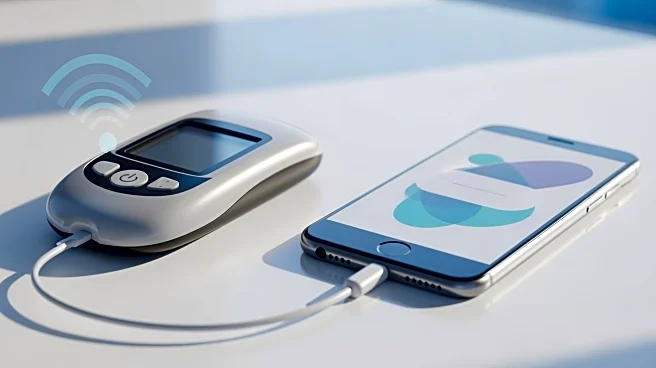What's Happening?
The Self-Monitoring Blood Glucose (SMBG) devices market is experiencing significant growth, driven by advancements in device features and increasing diabetes prevalence. Valued at USD 15 billion in 2025,
the market is projected to grow at a CAGR of 10.5% to reach USD 36.7 billion by 2034. SMBG devices, including glucose meters, test strips, and lancets, are essential for diabetes management, providing real-time insights for insulin-dependent diabetics. Manufacturers are focusing on integrating mobile apps for real-time tracking and enhancing user experience with wearable-compatible systems and Bluetooth-enabled meters. These innovations aim to make SMBG devices less invasive and more appealing for frequent monitoring.
Why It's Important?
The growth of the SMBG devices market is crucial as it addresses the rising global diabetes prevalence, driven by aging populations, sedentary lifestyles, and obesity. By providing real-time data, these devices empower patients to make informed decisions about their health, potentially reducing complications and improving outcomes. The integration with mobile apps and wearable technology reflects a broader trend towards personalized healthcare, where patients have greater control over their health data. This shift is likely to enhance patient engagement and adherence to treatment plans, ultimately improving public health and reducing healthcare costs.
What's Next?
As the market continues to expand, manufacturers may focus on further reducing the invasiveness of SMBG devices and improving their accuracy and speed. The integration of AI and machine learning could offer predictive insights, helping patients anticipate and manage fluctuations in blood glucose levels. Additionally, the market may see increased collaboration between tech companies and healthcare providers to develop comprehensive digital health solutions. Government initiatives and insurance coverage could also play a role in expanding access to SMBG devices, particularly in underserved regions.
Beyond the Headlines
The evolution of SMBG devices highlights the ethical and cultural dimensions of healthcare innovation. As technology becomes more integrated into daily health management, issues of data privacy and security become increasingly important. Ensuring that patient data is protected while enabling seamless sharing with healthcare providers is a critical challenge. Moreover, the focus on user-friendly designs and accessibility raises questions about health equity and the need to ensure that all patients, regardless of socioeconomic status, can benefit from these advancements.










